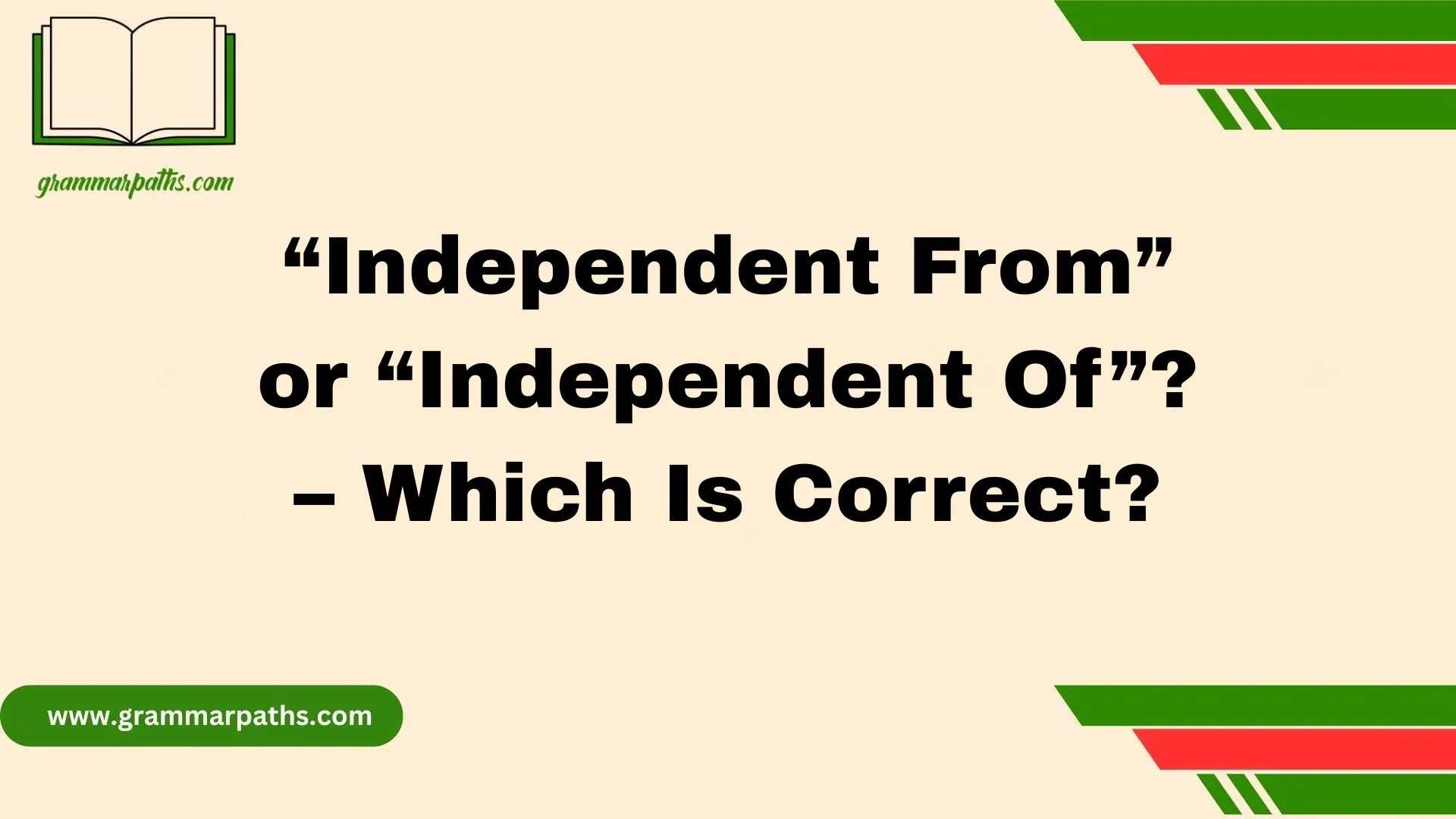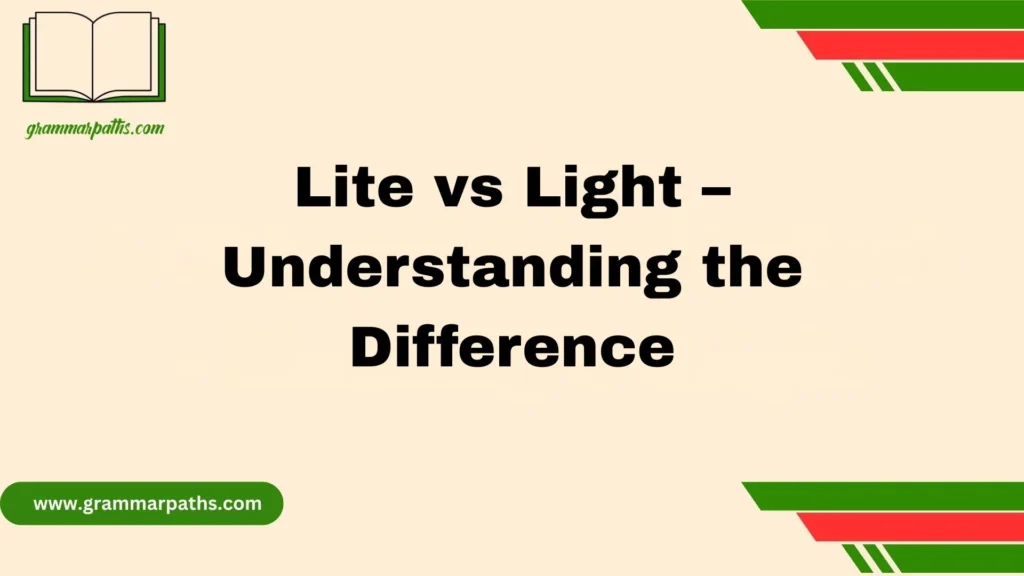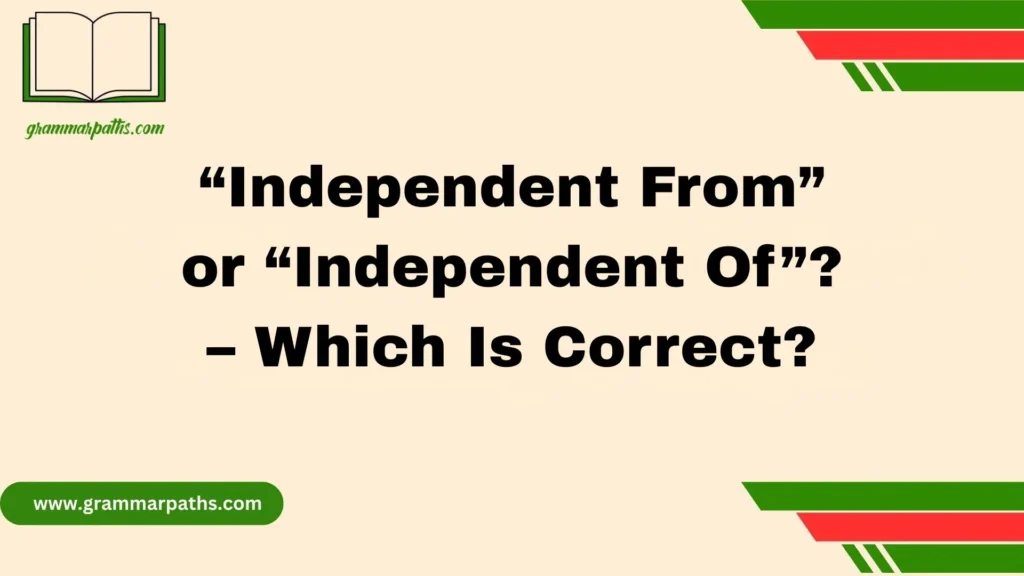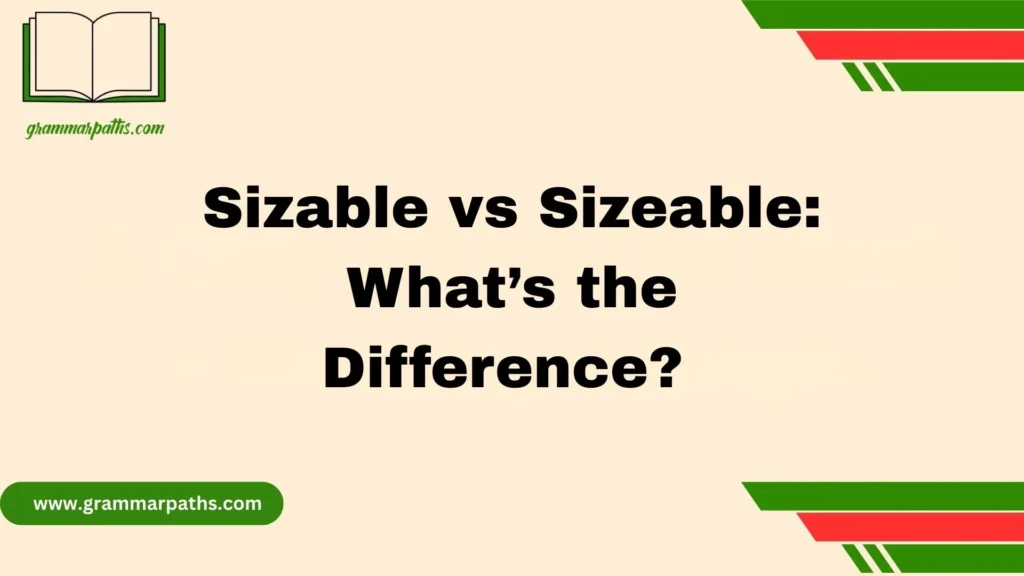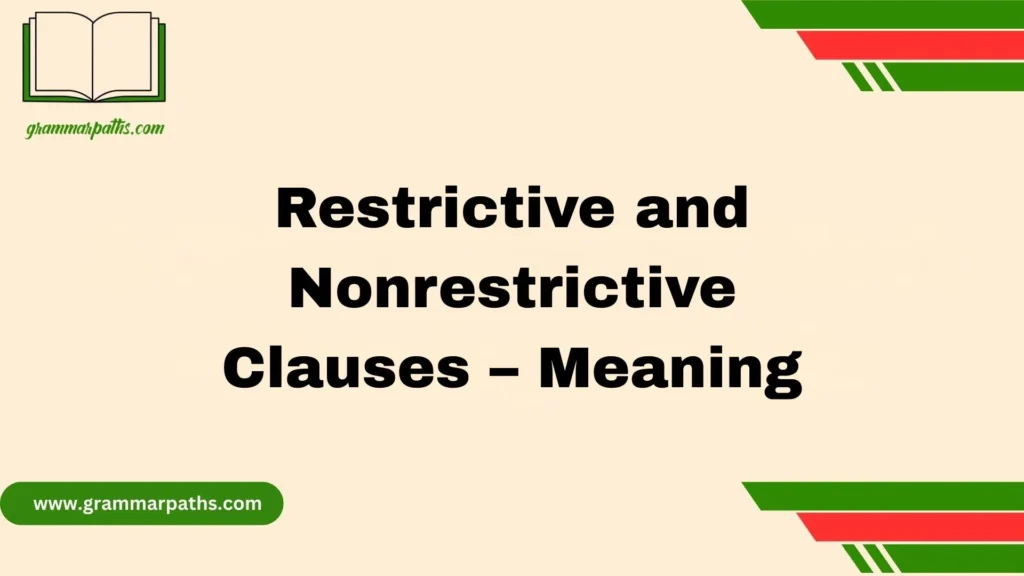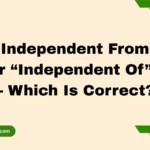When I first began learning English, the question of which preposition to use — Independent From or Independent Of — felt tricky, yet fascinating. The difference between them seemed small, but it carried big meaning for clarity, accuracy, and grammar. The Cambridge Dictionary defines independent as “not influenced or controlled by other people, events, or things.” So, the correct phrase is Independent Of, not Independent From.
This distinction in form and meaning gives your writing a more polished, proper tone, especially in formal and academic contexts like reports, legal contracts, and business documents. I’ve often noticed native speakers make this mistake, as both forms appear acceptable — but only one is considered right by style guides such as APA, MLA, and Chicago. Whenever I explain “Independent From” or “Independent Of”? – Which Is Correct?, I remind learners that grammar and clarity go hand in hand, shaping strong and confident expression.
Over the decades, patterns in language usage reveal that Independent Of has become the most popular choice. Google statistics even show it’s mentioned 17,100 times in The New York Times, while Independent From appears only 2,510 times. In my personal experience as a writer and editor, mastering this rule boosts confidence, improves communication, and helps tackle common slip-ups in everyday speech and writing.
Whether it’s academic papers, scholarly articles, or blog content, choosing the right preposition gives your message, tone, and credibility greater weight and authority. The structure and flow of sentences feel more consistent, simple, and clear, allowing your words to truly connect with the reader and leave a lasting impression.
Why This Phrase Confuses So Many English Speakers
English prepositions can be tricky. They often seem to follow no logic at all — and independent from vs independent of is a perfect example.
Take these two sentences:
- “The country is independent of foreign influence.”
- “The country is independent from foreign control.”
Both sound acceptable, right? But they feel slightly different. One implies freedom from influence, while the other hints at separation from authority.
This nuance is what makes English fascinating — and frustrating.
What Does “Independent” Actually Mean?
Before we untangle the prepositions, let’s look at the core word itself.
According to Merriam-Webster, “independent” means:
“Not subject to control by others; not relying on another for support or aid.”
Origin
The word comes from the Latin independens, meaning “not hanging from” or “not relying upon.”
Over time, it evolved to describe both freedom of thought and freedom from control.
Modern Use
In modern American English, independent can describe:
- A person (self-reliant or self-supporting)
- A country or organization (autonomous or sovereign)
- A system or variable (unaffected by others)
Examples:
- “She’s an independent woman.”
- “The United States became independent in 1776.”
- “The outcome is independent of initial conditions.”
So far, so good. But the preposition following independent changes the meaning subtly. Let’s unpack that.
The Grammar Behind “Independent Of” and “Independent From”
In English, some adjectives naturally pair with specific prepositions. We call these collocations — word pairings that sound “right” because they’ve evolved that way through usage.
Think of phrases like:
- afraid of
- good at
- interested in
- responsible for
“Independent” is one of those adjectives that can link to different prepositions — each carrying its own shade of meaning.
Common Adjective + Preposition Patterns
| Adjective | Preposition | Example Sentence |
| afraid | of | She’s afraid of spiders. |
| good | at | He’s good at math. |
| interested | in | They’re interested in art. |
| responsible | for | You’re responsible for the report. |
| independent | of/from | The agency is independent of political pressure. |
So both of and from can grammatically follow independent — but context dictates which one fits best.
“Independent Of” — The Standard and Most Accepted Form
When in doubt, go with “independent of.”
It’s the preferred form in American English and the default choice in formal writing.
Meaning
Use independent of when referring to freedom from influence, connection, or control — especially in abstract or conceptual contexts.
Examples
- “The judiciary is independent of the executive branch.”
- “Her decision was independent of personal bias.”
- “Scientific results must be independent of external funding sources.”
In these sentences, of signals freedom from external influence.
Usage in American English
Corpus data supports this preference. According to the Corpus of Contemporary American English (COCA) and Google Ngram Viewer, “independent of” appears 4–6 times more often than “independent from.”
That makes it the safe, standard choice in most American contexts — academic papers, professional writing, and journalism.
💡 Quick tip:
If your sentence refers to influence, thought, or connection, always choose independent of.
“Independent From” — When and Where It’s Used
Now, independent from isn’t wrong — it’s just less common and context-specific.
Meaning
Use independent from when describing physical or political separation — when something has broken away or stands apart from something else.
Examples
- “The country became independent from colonial rule.”
- “The new company is independent from its former parent organization.”
- “They wanted to be independent from outside interference.”
Here, from suggests detachment or separation, not just freedom from influence.
Regional Preference
In British English, “independent from” is more frequent. You’ll often find it in UK newspapers and academic writing.
In American English, though, “independent of” dominates — unless referring to political independence (like a nation’s separation).
Case Study: Political Independence
Example:
“In 1776, the thirteen colonies declared themselves independent from Great Britain.”
Notice how from fits perfectly here — it implies breaking away from control, not just functioning without influence.
So while independent from has a valid use, it’s narrower in scope.
Comparing “Independent Of” vs. “Independent From”
Here’s a side-by-side comparison to make it crystal clear:
| Aspect | Independent Of | Independent From |
| Meaning | Freedom from influence or connection | Physical or political separation |
| Context | Abstract, conceptual, formal | Physical, tangible, or political |
| Example | “Her analysis was independent of bias.” | “The island became independent from Spain.” |
| Formality | More formal and widely accepted | Informal or regional |
| Usage in US English | ✅ Preferred | ⚠️ Occasional, context-specific |
Summary:
👉 Use independent of for ideas, opinions, or systems.
👉 Use independent from for nations, groups, or physical detachment.
Real Usage Data: What Americans Actually Say
Language isn’t defined by rules — it’s defined by how people use it.
That’s why analyzing real-world data gives us the clearest answer.
Data Snapshot
According to Google Ngram Viewer, “independent of” is roughly five times more common than “independent from” in American publications.
In the Corpus of Contemporary American English (COCA):
- “Independent of” appears over 6,000 times
- “Independent from” appears about 1,200 times
That means native speakers overwhelmingly favor independent of — especially in educated or professional contexts.
Visualization:
| Phrase | Frequency (COCA) | Common Context |
| independent of | ~6,000+ | Academic, professional, legal |
| independent from | ~1,200 | Political, conversational, British English |
So if you’re writing for a US audience, independent of is almost always the better fit.
How Dialects Influence Preposition Choice
Language is alive — it changes with culture, geography, and even politics.
British English
- Tends to favor independent from more often, especially in political or national contexts.
- Example: “Scotland seeks to be independent from the UK.”
American English
- Strongly prefers independent of in almost all formal or conceptual uses.
- Example: “The central bank operates independent of political interference.”
Why This Difference?
It’s partly stylistic. British English leans toward prepositions that suggest separation, while American English favors those that express autonomy or neutrality.
The Related Phrase: “Independently Of” vs. “Independently From”
The confusion doesn’t end with adjectives — the adverb “independently” follows similar rules.
Meaning
“Independently” modifies how an action occurs — it means doing something without relying on or being influenced by others.
Examples
- Correct: “She acted independently of her team.”
- Correct: “The systems run independently from each other.”
Both are grammatically sound, but again, of is the preferred choice in formal writing.
When to Use Each
| Phrase | When to Use | Example |
| independently of | Influence, conditions, variables | “The data was analyzed independently of funding.” |
| independently from | Separate entities | “Each branch operates independently from the main office.” |
💬 Quote:
“In professional writing, the preposition of maintains neutrality and precision, while from emphasizes division.” — Cambridge Grammar of English
Common Mistakes and How to Avoid Them
Even native speakers mix these up. Let’s clarify the most common errors.
Mistake #1: Using “Independent From” in Abstract Contexts
❌ “Her opinion is independent from others.”
✅ “Her opinion is independent of others.”
Use of when talking about ideas, influence, or opinions.
Mistake #2: Using “Independent Of” in Separation Contexts
❌ “The island became independent of Spain.”
✅ “The island became independent from Spain.”
Use from when describing a breakaway or separation.
Memory Trick
🧠 If it’s about influence — use “of.”
If it’s about separation — use “from.”
That one sentence can save you from ever mixing them up again.
Expert Insights and Style Guide Recommendations
Let’s see what trusted linguistic authorities say.
| Authority | Recommendation | Note |
| Merriam-Webster | “Independent of” is more idiomatic in American English. | Standard use in formal contexts. |
| Cambridge Dictionary | Accepts both; prefers “of” in global English. | “From” is mainly British. |
| The Chicago Manual of Style | Recommends consistency — use “independent of” unless describing separation. | Used in academic and professional writing. |
| Oxford English Grammar | “Independent from” is correct for political independence. | “Independent of” dominates otherwise. |
So while both are grammatically correct, style guides overwhelmingly favor “independent of.”
Practical Examples in Different Contexts
Here’s how these prepositions play out in real scenarios:
Business
- “The audit committee operates independent of management influence.”
- “The subsidiary functions independent from its parent company.”
Politics
- “The Supreme Court is independent of political parties.”
- “The state declared itself independent from federal control.”
Science & Research
- “The results were independent of the testing conditions.”
- “Each sample was analyzed independently of the other.”
Personal Life
- “I’ve always wanted to be independent from my parents.”
- “Her happiness is independent of others’ opinions.”
Quick Reference Chart
| Situation | Correct Form | Example |
| Freedom from influence | independent of | “The findings were independent of bias.” |
| Separation from a group | independent from | “The nonprofit became independent from the government.” |
| Acting autonomously | independently of | “They worked independently of supervision.” |
Idioms and Related Expressions
Understanding independent helps you recognize common idioms and expressions:
| Expression | Meaning | Example |
| declare independence from | to formally separate | “The country declared independence from its colonizer.” |
| financially independent | self-supporting | “She became financially independent at 25.” |
| independent thinker | self-reliant in thought | “He’s an independent thinker, not swayed by trends.” |
| independent variable | statistical term | “The independent variable affects the dependent variable.” |
These phrases highlight how independence always involves freedom or separation, whether mental, financial, or political.
Summary: Which Should You Use?
Let’s wrap it up simply.
- Use “independent of” when referring to freedom from influence, bias, or connection.
- Use “independent from” when describing physical or political separation.
- When unsure, choose “independent of” — it’s the more widely accepted and neutral form.
In short:
✅ Independent of = freedom from influence
⚙️ Independent from = separation from something tangible
Precision in preposition choice doesn’t just polish your English — it boosts your credibility and professionalism.
Conclusion
Understanding whether to use Independent From or Independent Of can seem tricky at first, but once you grasp the meaning and usage, it becomes clear and simple. The Cambridge Dictionary and other respected style guides like APA, MLA, and Chicago confirm that Independent Of is the correct form.
This small distinction in grammar not only improves the accuracy of your writing but also adds clarity, authority, and confidence to your communication. Whether you’re writing academic papers, legal contracts, or blog content, using the right preposition shows your command of the English language and enhances the overall flow and credibility of your message.
FAQs
1. Why is “Independent Of” correct and not “Independent From”?
Because “Independent Of” means something is not influenced or controlled by another thing. “Independent From” sounds natural but is not considered grammatically correct in formal writing.
2. Can I still use “Independent From” in casual speech?
Yes, it’s common in everyday English, but in academic or professional contexts, it’s best to stick with “Independent Of” for clarity and accuracy.
3. What do style guides like APA or MLA say about this?
APA, MLA, and Chicago all recommend using Independent Of as the proper preposition because it aligns with standard grammar and usage patterns.
4. How can I remember which one to use?
Think of “Independent Of” as showing freedom or separation from influence — if something is not controlled, it’s independent of it.
5. Has this changed over time?
No. Even though Google statistics show that Independent From appears 2,510 times and Independent Of 17,100 times, the latter remains the most popular and correct choice over the decades.
6. Does using the correct preposition really matter?
Absolutely! It boosts your credibility, improves communication, and helps you write with confidence and style, whether in formal writing, academic papers, or business documents.

Grace Marie is the dedicated writer behind GrammarPaths.com, where she shares her passion for English grammar, idioms, and writing mastery. With a strong background in language studies and years of experience helping learners improve their communication skills, Grace creates clear, practical, and engaging content that makes English easy to understand.
